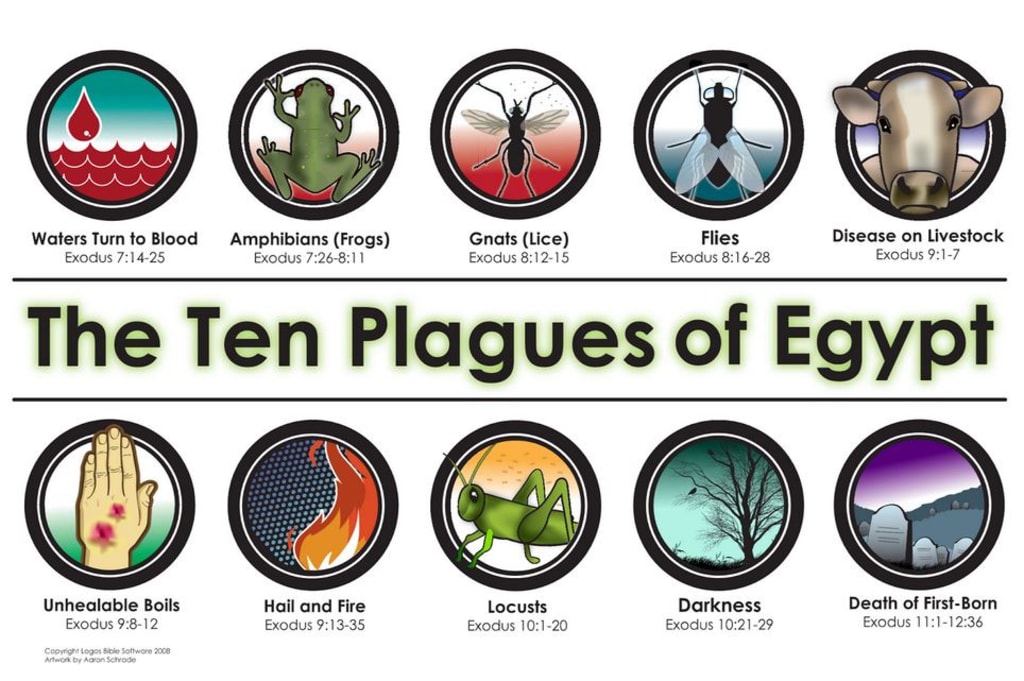The Ten Plagues of Egypt: Divine Lessons in Exodus
The Ten Plagues of Egypt: Divine Lessons in Exodus

The Ten Plagues of Egypt: Divine Lessons in Exodus
In the annals of human history, there exist stories that resonate through the ages—tales of triumph, suffering, and transcendence. Among these, the account of the ten plagues of Egypt stands as a remarkable and enduring narrative, a pivotal chapter in the biblical Book of Exodus. It is a story of liberation, divine intervention, and the profound lessons learned on the arduous path to freedom.
The tale unfolds in the land of Egypt, where the Israelites, descendants of Jacob, found themselves enslaved and oppressed. Their cries for deliverance reached the ears of the God of Abraham, Isaac, and Jacob—Yahweh. In response to their suffering, Yahweh called upon Moses, a humble shepherd, to lead his people out of bondage.
Moses, armed with faith and conviction, stood before Pharaoh, the mighty ruler of Egypt, and delivered Yahweh's message: "Let my people go!" But Pharaoh, his heart hardened, refused to heed this divine command. And so began a sequence of events that would become known as the ten plagues of Egypt.
The first plague, the turning of the Nile River into blood, was a symbolic act of justice. The Nile, the lifeblood of Egypt, was transformed into a river of death. The waters ran red with blood, and the fish died, rendering the river undrinkable. But Pharaoh's heart remained obstinate, and he did not release the Israelites.
The second plague brought forth a swarm of frogs that infested Egypt, invading homes and even beds. They leaped into ovens and kneading bowls, a relentless plague that filled the land with discomfort and filth. Again, Pharaoh's resolve remained unbroken.
The third plague unleashed swarms of lice or gnats, covering people and animals alike. This plague was different, for it seemed to defy explanation. The magicians of Egypt could not replicate it, and they declared, "This is the finger of God." Yet Pharaoh's heart remained hardened, and he did not relent.
The fourth plague, a horde of flies, descended upon Egypt, except for the land of Goshen, where the Israelites resided. The distinction was made clear, as Yahweh's protection of his people became evident. Pharaoh, however, continued to resist.
The fifth plague brought a deadly pestilence upon the livestock of Egypt. Horses, donkeys, camels, and cattle fell ill and perished, while the livestock of the Israelites remained unharmed. Yet still, Pharaoh's heart was unyielding.
The sixth plague brought painful and festering boils upon the people and animals of Egypt. The discomfort and agony were overwhelming, but Pharaoh remained unmoved.
The seventh plague, a tempest of hail and fire, rained down upon Egypt. Hailstones, mixed with fire, blazed through the sky and struck everything in their path, causing destruction and devastation. Pharaoh momentarily relented, but his heart soon hardened again, and he refused to release the Israelites.
The eighth plague, swarms of locusts, devoured every green thing that had survived the hail. The land was left barren and desolate, a stark reminder of the consequences of Pharaoh's stubbornness.
The ninth plague, a shroud of darkness, enveloped Egypt for three days. It was a darkness so thick and oppressive that it could be felt. Yet even as the land was plunged into obscurity, Pharaoh remained unyielding.
Finally, the tenth and most devastating plague arrived—the Angel of Death passed through Egypt, striking down the firstborn of every household. It was a night of sorrow and anguish, a night that forever altered the course of history.
In the midst of this despair, Pharaoh's heart finally relented. He summoned Moses and Aaron, pleading for the Israelites to leave Egypt. The long-awaited moment of liberation had arrived, and the Israelites departed with great haste, carrying with them the lessons learned in the crucible of suffering.
The story of the ten plagues of Egypt is a powerful testament to the enduring human spirit and the divine forces that shape our destinies. It teaches us that even in the face of great adversity and tyranny, there is hope for redemption and freedom.
It also reminds us of the importance of compassion, humility, and the recognition of the divine in our lives. The plagues were not merely acts of punishment; they were opportunities for Pharaoh and the people of Egypt to recognize the power and justice of Yahweh.
In the end, the tale of the ten plagues of Egypt is a timeless narrative that continues to resonate with people of all faiths and backgrounds. It is a story of the triumph of good over evil, of liberation from oppression, and of the enduring human quest for justice and freedom—a narrative that continues to inspire and guide us on our own journeys of faith and self-discovery.
About the Creator
Raymark Marcos
A Writer and Guitarist
A son of God
A student who's doing a lot of side hustles to earn enough money to be able to go for college.






Comments
There are no comments for this story
Be the first to respond and start the conversation.